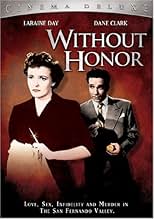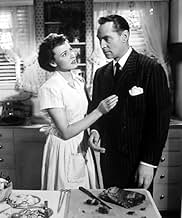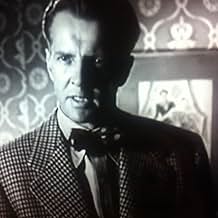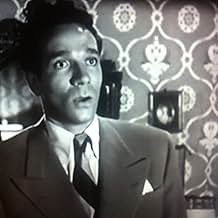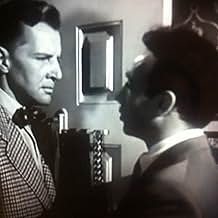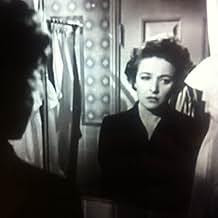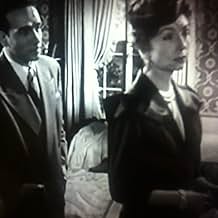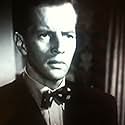Ajouter une intrigue dans votre langueJane Bandle has recently married, but Bill, her husband's brother, tries to wreck her marriage because Jane rejected his sexual advances before her marriage.Jane Bandle has recently married, but Bill, her husband's brother, tries to wreck her marriage because Jane rejected his sexual advances before her marriage.Jane Bandle has recently married, but Bill, her husband's brother, tries to wreck her marriage because Jane rejected his sexual advances before her marriage.
- Réalisation
- Scénario
- Casting principal
- Récompenses
- 1 nomination au total
Marjorie Stapp
- Neighbor's Wife
- (as Margie Stapp)
Irving Pichel
- Narrator
- (voix)
- (non crédité)
Avis à la une
I usually refrain from commenting on films because there are so many other reviewers out there...but seeing how this just has one review and a very negative, I felt I should offer my opinion.
I'll admit the first 20 or 30 minutes felt like a typical Hollywood pot-boiler. Cheating wife accidentally kills lover; will she get away with it; etc. After this set-up, the film becomes an onion - revealing new layers of characters' motivations and back-story.
Laraine Day stands out superbly as the cheating wife...whole scenes develop around her without her speaking, yet we know what's going on in her mind.
I have to agree with the other reviewer that I loved Steiner's score...but did feel it inappropriate at times. The performances on screen are very subtle and the music is anything but subtle.
I particularly enjoyed the second half of the film as characters acted against stereotypes.
The DVD I watched was from Geneon and featured an adequate transfer; not stellar, but much above average from the usual run-of-the-mill public domain stuff.
I'll admit the first 20 or 30 minutes felt like a typical Hollywood pot-boiler. Cheating wife accidentally kills lover; will she get away with it; etc. After this set-up, the film becomes an onion - revealing new layers of characters' motivations and back-story.
Laraine Day stands out superbly as the cheating wife...whole scenes develop around her without her speaking, yet we know what's going on in her mind.
I have to agree with the other reviewer that I loved Steiner's score...but did feel it inappropriate at times. The performances on screen are very subtle and the music is anything but subtle.
I particularly enjoyed the second half of the film as characters acted against stereotypes.
The DVD I watched was from Geneon and featured an adequate transfer; not stellar, but much above average from the usual run-of-the-mill public domain stuff.
Franchot Tone, him married to Agnes Moorehead and Laraine Day, her married to
Bruce Bennett have been carrying on an affair, but Tone comes over to Day's house while Bennett's away and says time to end it. Bennett's a dull sort and
Day doesn't want things to end. She gets positively hysterical and remains so
the rest of the film with the events that follow. Quite a bit does follow.
Manipulating all that is going on is Dane Clark who is Bennett's brother and it's positively Iago like the way he controls all around him. This might have been Dane Clark's best moment on the big screen as it is Laraine Day's.
If this is ever remade and maybe it should be, it will be a great example about how the Code could nearly ruin a story. The censorship was such that so much was left out in the telling.
Still a nice piece of melodrama.
Manipulating all that is going on is Dane Clark who is Bennett's brother and it's positively Iago like the way he controls all around him. This might have been Dane Clark's best moment on the big screen as it is Laraine Day's.
If this is ever remade and maybe it should be, it will be a great example about how the Code could nearly ruin a story. The censorship was such that so much was left out in the telling.
Still a nice piece of melodrama.
This Odd Film is Loaded with Edgy Entertainment that Challenged Censors.
In this Downbeat Norish Drama it Confronts Head-On... Adultery, Murder, Suicide, and a Bi-Sexual Incestuous Obsession.
The Wordy Script Takes Place in One Location in a Few Rooms.
With Loraine Day Giving a Difficult Almost Wordless Performance.
The Writing is Sharp and the Performances are Top B-Movie Gold.
The Film's Downfall, if it has one, is the Constant Verbiage and Run-On Dialog by Dane Clark.
It is the Antithesis of Day's Silent Portrayal.
Clark's Constant Jabbering is a Dated, Nervous, Non-Stop Accosting of His Brother's (Bruce Bennett) Wife and His Brother.
He Reveals an Unhealthy Attachment to His Sibling.
Also an Equal Hatred for and Jealousy of Loraine Day.
His Actions are Loathsome and Neurotic.
With Relentless Force and those Dated Antics may be Difficult for some Viewers to Watch.
Along with Bennett, Agnes Moorehead, in a Minor but Crucial Role is Outstanding, but so is the Entire Cast.
Underlined by Max Steiner's Striking Score and a Plot Twist or Two.
The Ensemble Production Manages to Compel the Overloaded Story. And Bring it Together for a Strange and Unique Viewing Experience, Especially in 1949.
Above Average and Certainly...
Worth a Watch.
In this Downbeat Norish Drama it Confronts Head-On... Adultery, Murder, Suicide, and a Bi-Sexual Incestuous Obsession.
The Wordy Script Takes Place in One Location in a Few Rooms.
With Loraine Day Giving a Difficult Almost Wordless Performance.
The Writing is Sharp and the Performances are Top B-Movie Gold.
The Film's Downfall, if it has one, is the Constant Verbiage and Run-On Dialog by Dane Clark.
It is the Antithesis of Day's Silent Portrayal.
Clark's Constant Jabbering is a Dated, Nervous, Non-Stop Accosting of His Brother's (Bruce Bennett) Wife and His Brother.
He Reveals an Unhealthy Attachment to His Sibling.
Also an Equal Hatred for and Jealousy of Loraine Day.
His Actions are Loathsome and Neurotic.
With Relentless Force and those Dated Antics may be Difficult for some Viewers to Watch.
Along with Bennett, Agnes Moorehead, in a Minor but Crucial Role is Outstanding, but so is the Entire Cast.
Underlined by Max Steiner's Striking Score and a Plot Twist or Two.
The Ensemble Production Manages to Compel the Overloaded Story. And Bring it Together for a Strange and Unique Viewing Experience, Especially in 1949.
Above Average and Certainly...
Worth a Watch.
Without Honor is directed by Irving Pichel and written by James Pope. It stars Dane Clark, Laraine Day, Franchot Tone and Agnes Moorehead. Music is by Max Steiner and cinematography by Lionel Lindon.
A mixed bag on offer in this one, where a broth of "sins" is stirred suitably in predominantly one location. Set-up bares a striking resemblance to Hitchcock's Rope released the previous year, where a group of characters are thrust together in one living room deconstructing their sins, shattered dreams and ulterior motives - all while a supposed dead body lays prone in one of the bedrooms.
The thematics at work are prime film noir, adultery, suicide attempt, sexual aggression, jealous agenda, duping and etc, all of which only comes to life half way through the piece. Here in is the problem, the pic asks for a lot of patience from the viewer before really getting going, which although the character group dynamic is pungent with an unsavoury odour, it never fully gets out of first gear.
Things aren't helped by the flat visual look of the piece, where with the story set in daytime, we yearn for a bit of noir flourish from one of the ace noir photographers of the time. Then there's Steiner's score, which is a cracker, ebullience in abundance, only it's in the wrong film! Moorehead is wasted in what is ultimately a walk on passive role, but at least Clark and Day nail the traits of their respective characters.
No hidden gem here, and noir hunters should be advised this is only noir from a plot perspective, but enough damaged human conditioning here to make it above average. 6.5/10
A mixed bag on offer in this one, where a broth of "sins" is stirred suitably in predominantly one location. Set-up bares a striking resemblance to Hitchcock's Rope released the previous year, where a group of characters are thrust together in one living room deconstructing their sins, shattered dreams and ulterior motives - all while a supposed dead body lays prone in one of the bedrooms.
The thematics at work are prime film noir, adultery, suicide attempt, sexual aggression, jealous agenda, duping and etc, all of which only comes to life half way through the piece. Here in is the problem, the pic asks for a lot of patience from the viewer before really getting going, which although the character group dynamic is pungent with an unsavoury odour, it never fully gets out of first gear.
Things aren't helped by the flat visual look of the piece, where with the story set in daytime, we yearn for a bit of noir flourish from one of the ace noir photographers of the time. Then there's Steiner's score, which is a cracker, ebullience in abundance, only it's in the wrong film! Moorehead is wasted in what is ultimately a walk on passive role, but at least Clark and Day nail the traits of their respective characters.
No hidden gem here, and noir hunters should be advised this is only noir from a plot perspective, but enough damaged human conditioning here to make it above average. 6.5/10
I saw this when I was 10, when movies were double features and the fare changed weekly. I only remembered it because I loved Day, not because of being an actress, but because she was Leo Durocher's wife and I was a Baseball nut. I saw it again recently on TCM. This movie defies a reason for being, except that the studios needed constant fodder and this film proves the point that it was often volume over content. We are still being crammed with movies that ask the same question, What Were They Thinking, but lack the old excuse.
Day's acting, consisting primarily from 'reacting', is an embarrassment on the same footing as the unlikely dialogue given to the rest of the cast. Her opening scene with Clark makes for great comedy as she goes thru a 360 degree range of reactions to his 25 or so separate avenues of dialogue, mostly questions she never answers. And he's oblivious to the strangeness of her conduct. From there it only gets worse.
It's hard to believe it's the same Day who shown so brilliantly in Mr. Lucky or a movie with such confusing plot turns, but unlike The Big Sleep, where you didn't notice or care.
Day's acting, consisting primarily from 'reacting', is an embarrassment on the same footing as the unlikely dialogue given to the rest of the cast. Her opening scene with Clark makes for great comedy as she goes thru a 360 degree range of reactions to his 25 or so separate avenues of dialogue, mostly questions she never answers. And he's oblivious to the strangeness of her conduct. From there it only gets worse.
It's hard to believe it's the same Day who shown so brilliantly in Mr. Lucky or a movie with such confusing plot turns, but unlike The Big Sleep, where you didn't notice or care.
Le saviez-vous
- AnecdotesThis film offers a rare glimpse at a contemporary 1949 television set, a bulky table model with a ten-inch rectangular screen, which commonly was required to be "set up" by qualified technicians who also needed to install an antenna on the roof before proper reception could be achieved. Commercial television broadcasts had begun in Los Angeles two years earlier in 1947 on KTLA (Channel 5).
- GaffesJane is said to have broken a heel In the fall that caused her to miss her escape by bus, but as she picks up a broken heel off the ground and carries it with her, the heels on the shoes on both her feet remain intact and attached.
- Citations
Fred Bandle: [picking Jane up on the dusty road, oblivious to her foiled attempt at escape] Where were you? Out for a walk? You busted a heel, huh? Well you shouldn't wear heels on a street like this.
Meilleurs choix
Connectez-vous pour évaluer et suivre la liste de favoris afin de recevoir des recommandations personnalisées
Détails
- Durée
- 1h 9min(69 min)
- Couleur
- Rapport de forme
- 1.37 : 1
Contribuer à cette page
Suggérer une modification ou ajouter du contenu manquant

